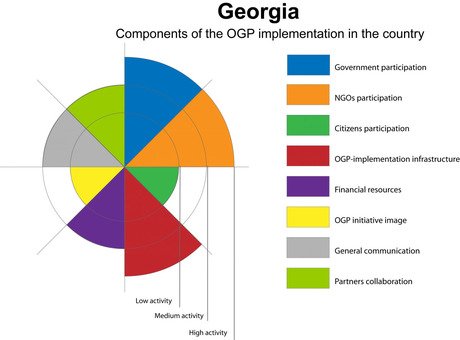The government decided
to create a single electronic system of interaction with
citizens and transfer the key administrative services to the
Internet. This is where the process halted.
E-government
has long been a reality not only in distant
countries like Singapore, the US or Sweden, but also in
former Soviet countries, such as Georgia,
Moldova or Estonia.

Back in the 1990s these
nations realized that transition to an electronic system of
procurement could save up to 50 percent of
the typical expenses from
the state budget. Due to
e-procurement, Georgia saved $200 million in just
two years. Moldova is currently actively advancing the idea of
a single datacenter, on the basis of which government agencies are
providing unified services to citizens.
Ukraine, however,
is trying to live by old habits. The latest promise the government
made to the world community is Ukraine’s accession to the
international Open Government Partnership Initiative. It was launched
in September 2011 in order to introduce standards of openness and
transparency of governments’ actions. To date 57 countries, Ukraine
included, have joined the initiative.
The Ukrainian
government adopted a national action
plan for the implementation
of the open government
idea with the following priorities:
a) community participation;
b) counteraction to corruption;
c) access to information;
d) administrative services; and
d) e-governance.
But again, there has been
no progress beyond adopting the action plan.
Can it be done otherwise? The
experience of our neighbors shows that it can. Jointly with their
partners in Russia, Georgia, Armenia, Azerbaijan and Moldova,
Transparency International Ukraine analyzed the government’s
actions of implementing the open government plan.
Their attention was centered on
government participation, nongovernmental
organization participation, community participation,
implementation infrastructure, financial resources, image of
e-government, general communication, and
partners engagement.
It’s not difficult to see the
interdependence of the indexes of infrastructure development of
e-governance and the level of a government’s engagement in its
implementation. The high political will in all the countries, except
for Ukraine, is also obvious.
There’s something we can learn from
our neighbors – in Georgia, Armenia, Azerbaijan and Moldova.
E-governance is working.
In Georgia, public procurement is carried out online. In Armenia, an
interactive budget has been adopted; the sessions of the government
are transmitted online.
Moldova’s leadership cherished an
ambitious plan to complete an e-transformation by 2020, i.e., to
switch over to a total electronic form of reporting.
In Russia, the idea
of e-governance is becoming fashionable due to the government’s
propaganda machine and the support of key media people behind it.

In Ukraine, Russia and Azerbaijan, the
idea of e-governance forced the authorities to
greater interaction with the public.
Incidentally, participation of
non-government sector is practically the only
indicator in which Ukraine has achieved a high score. Because of
active NGO involvement, 80 percent of the national
action plan
consists of their proposals.
In all the countries
we reviewed the citizens know very little about the e-governance.
In Armenia, 5 percent of the population has some
knowledge of the project, for instance.
Some countries are
taking actions to increase public awareness and engagement. Georgia
is holding student competitions to improve the action plan, while
Moldova is engaging senior students for internship at government
departments for e-transformation.
In Ukraine there are four key dangers
in implementation of
e-government plan:
Lack of an efficient coordination
mechanism between the government agencies responsible for the Open
Government Partnership Initiative and between the government
and NGOs.
Inadequate quality of enacted
legislation.
Insufficient budget funds for
implementing the “electronic governance.”
Deadlines are
impossible to observe due to the highly bureaucratic process
of decision-making that causes substantial delays.
To advance the
implementation of e-governance, both the authorities and the NGOs
need to create an efficient permanent mechanism
for communication. Also, the government
should get serious about control and management of e-governance
action plan. The government is not experienced enough in
conducting a transparent dialogue with NGOs and needs support and
recommendations in establishing the much-needed
communication mechanism.
Oleksii Khmara is the president
of Transparency International Ukraine. Olga
Tymchenko is communications
department head
of Transparency International Ukraine. Olena
Kifenko is head of fundraising and
the international relations
department of
Transparency International Ukraine.
